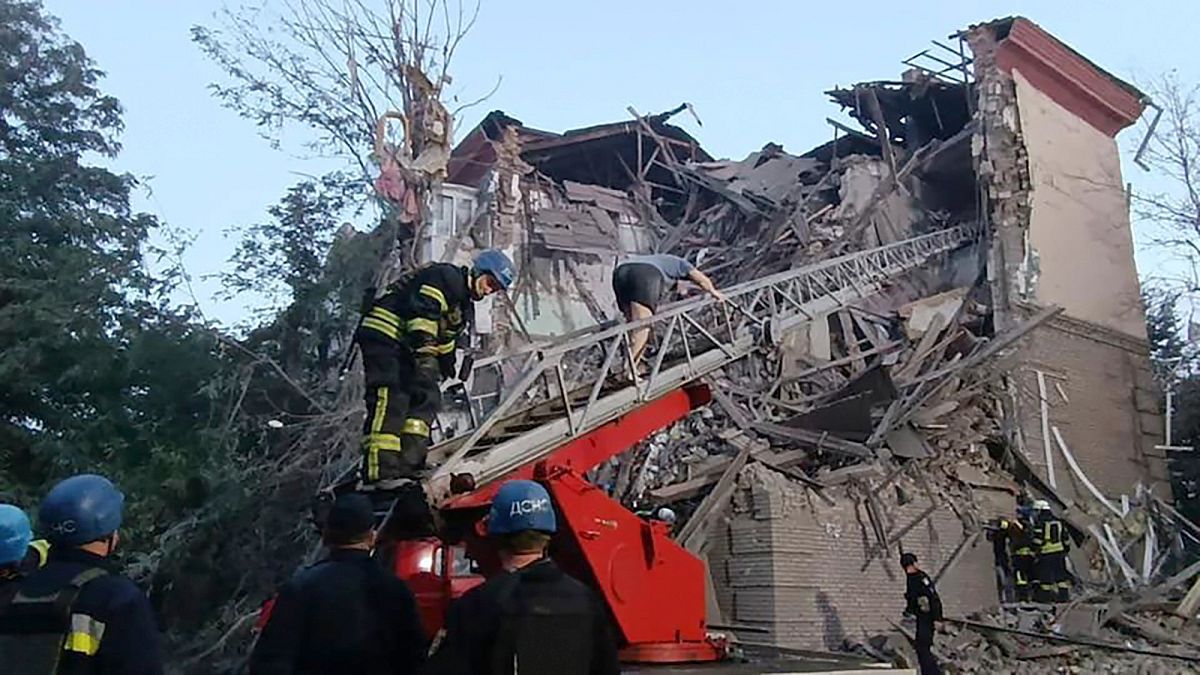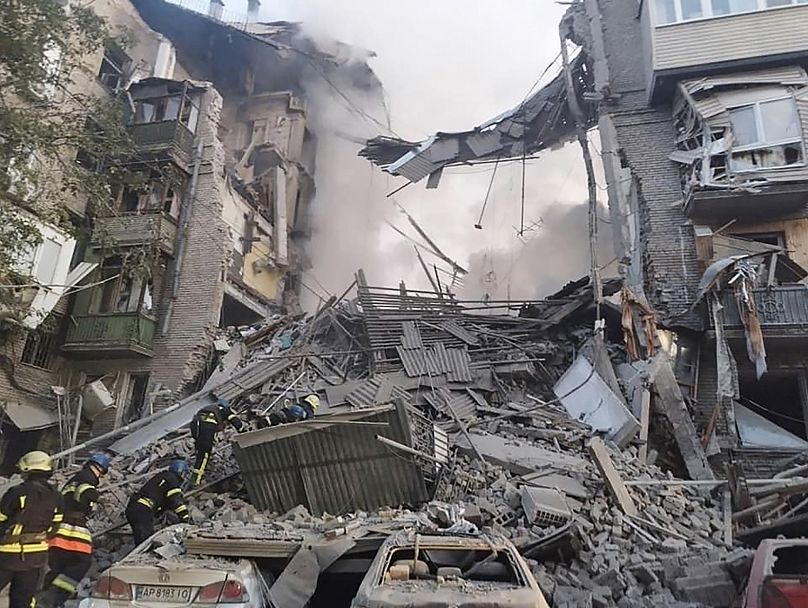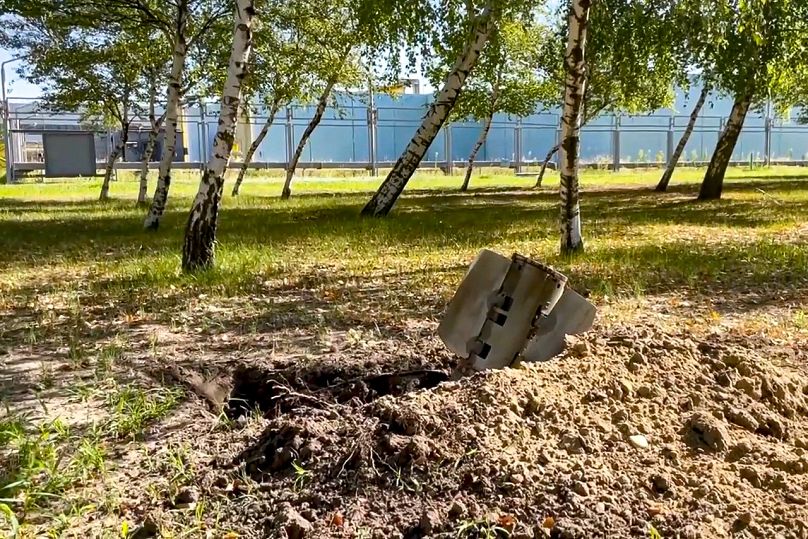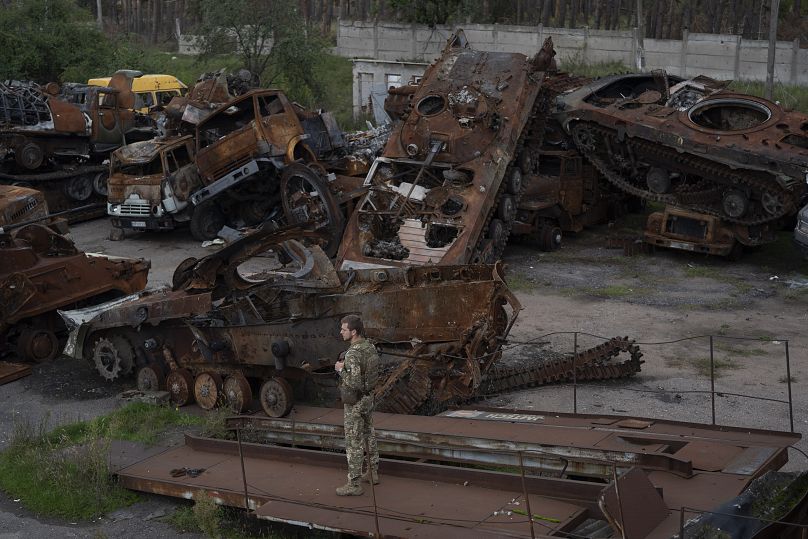Here is our latest round-up of what's happening in the Ukraine war.
1. People 'buried in rubble' of Zaporizhzhia building hit by Russian missile
A Russian missile attack on the city of Zaporizhzhia left some people trapped in the rubble of an apartment block that was demolished, the region's governor has said.
At least three people died and five were reported missing after the strikes, Oleksandr Starukh said on Thursday. A woman who was earlier reported dead had survived while five people were still trapped under the rubble, he added.
Overnight, seven Russian missiles hit the city of Zaporizhzhia, damaging more than 40 buildings and causing injuries. It was a reminder of Moscow's ability to strike targets even at a time when its forces have been pushed back in the south and east.
Ukraine's emergency service said a total of three bodies had been pulled from the rubble. Twelve people were also wounded, including a three-year-old child.
Starukh said on Telegram that Russian forces had aimed at "high-rise buildings". Moscow has always denied that it deliberately targets civilians.
Last week, at least 30 people were killed in a strike on a convoy of civilian cars near a Zaporizhzhia crossing point between the Ukrainian-controlled and Russian-occupied territory.
The Ukrainian presidency said on Thursday that 14 people had been also killed in attacks in the Donetsk region in the previous 24 hours.
Ukrainian law enforcement officials say they have also discovered more evidence of torture and killings in areas retaken from Russian forces.
"The Russians continue to deliberately strike civilians to spread fear," Ukrainian Foreign Minister Dmytro Kouleba wrote on Twitter.
"Russian terror must be stopped: by force of arms, by sanctions and by complete isolation" of Moscow, he urged.
2. Official turns on Moscow top brass over Ukraine's advances in Kherson
Ukraine says its army has recaptured more settlements in Kherson, one of the four Russian-occupied regions that the Kremlin recently annexed.
A spokesperson for Kyiv's southern military command said the Ukrainian armed forces have retaken more than 400 square kilometres since the start of October.
Ukraine's President, Volodymyr Zelenskyy, said the villages of Novovoskresenske, Novohryhorivka and Petropavlivka to the northeast of Kherson city had been "liberated".
A senior Russian-installed official in the Kherson region turned on the top brass in Moscow for failing to understand the problems on the front — and suggested the defence minister commit suicide.
"Indeed, many say: if they were a defence minister who had allowed such a state of affairs, they could, as officers, have shot themselves," said Kirill Stremousov, 45. "But you know the word 'officer' is an incomprehensible word for many."
Russian Defence Minister Sergei Shoigu one of Putin's closest allies. But many Russian nationalists have blamed him and top generals for military failures.
Thousands of Russian troops have retreated from front lines in the south and east since September following Ukraine's military counter-offensive.
This further sign of dissent in Russian ranks came after Vladimir Putin signed constitutional decrees on Wednesday to formally annex the four Ukrainian regions of Luhansk, Donetsk, Kherson and Zaporizhzhia -- around 18% of Ukraine’s territory.
Putin said on Wednesday that the country's troops will "stabilise" the situation in the four annexed Ukrainian regions.
The annexations raise the possibility of an escalation in the war, as Putin and other officials have said they could use nuclear weapons to protect Russian territory. Ukraine has said it will not be cowed by any nuclear threats.
In his nightly address, Zelenskyy spoke briefly in Russian to address pro-Kremlin forces, telling them they had already lost the war.
"Ukrainians know what they are fighting for. And more and more citizens of Russia are realizing that they must die simply because one person does not want to end the war," he said in a reference to Putin.
Moscow's military map of Ukraine appears to show shrinking areas it controls.
A map of "new regions" published by the state news agency RIA included the full territory of the Ukrainian provinces but some parts were labelled as being under Ukrainian military control.
Earlier, the Ukrainian governor of the Luhansk region, announced that several settlements had been reclaimed. Until now, the eastern region had been under almost total control by Moscow.
The Russian army said on Wednesday it had carried out "massive strikes" near Lyman, a strategic Donetsk town that was recently recaptured by Ukrainian forces.
The town had been Russia's main bastion in the northern part of Donetsk, supplying forces in the neighbouring Luhansk region.
Watch the video below for the latest on Ukraine's counteroffensives, with Euronews' Sasha Vakulina.
3. Ukraine accuses Russia of 'nuclear blackmail' over Zaporizhzhia plant
Ukrainian President Volodymyr Zelenskyy accused Russia on Thursday of "nuclear blackmail" over its seizure of the Zaporizhzhia power plant in southern Ukraine.
Russia captured the plant in March, shortly after invading Ukraine, and President Vladimir Putin ordered his government on Wednesday to take control of it after declaring the annexation of the region where it is located.
The plant is Europe's largest, and Ukrainian staff have continued to operate it.
"(The) capturing of Zaporizhzhia nuclear power plant (stands) for nuclear blackmail and for exerting pressure on the world and on Ukraine," Zelenskyy said in a video address to the Sydney-based Lowy think-tank via a translator.
"You're not using the weapons, but you can still be blackmailing by not having the nuclear power plant working for the people — the people are not receiving the electricity."
Ukraine’s Foreign Ministry said it considered Putin’s decree “null and void”.
The power station is right on the front line, on a Russian-controlled bank of a reservoir with Ukrainian forces on the opposite bank, and both sides have warned of the danger of a nuclear disaster.
In recent days, Russia detained the plant's Ukrainian manager. He was released but will not return to work.
The head of Ukraine's state nuclear energy company Energoatom said he was taking charge of the plant and urged workers not to sign any documents with its Russian occupiers.
Kyiv has long accused Moscow of planning to switch the plant from Ukraine's power grid to Russia's, which it says would increase the risk of an accident.
The head of the UN nuclear watchdog (IAEA) described the Zaporizhzhia nuclear power station as Ukrainian on Thursday, in defiance of Putin's annexations.
"This is a matter that has to do with international law," Rafael Grossi told a news conference during a visit to Kyiv for talks with Zelenskyy. "We want the war to stop immediately, and of course the position of the IAEA is that this facility is a Ukrainian facility."
Following Putin's decree, Grossi — who is also due to visit Moscow — said he had learned of plans to restart one reactor at the plant and stated that negotiations on a safe zone around the plant were more important than ever.
He said the number of inspectors that the IAEA plans to deploy to the plant would be doubled to four.
4. Hundreds of Russians detained near Estonia border, says Ukraine
The head of Ukraine’s human rights commission says Russian authorities detained hundreds of Ukrainians as they neared Russia’s border with Estonia.
Dmytro Lubinets wrote in a post on his Facebook page on Thursday that Russians “took them away on trucks to an unknown destination” a day earlier. He cited information from the Estonian Interior Ministry about the transfers.
Amid Russia’s war in Ukraine, most of those Ukrainians had fled their country through Russia and Crimea and were seeking ways to enter the European Union — Estonia is a member state — or find a way to return home, Lubinets wrote.
Some travellers, including women, the elderly, and children, were waiting to cross the Russia-Estonia border in cold, humid weather without proper clothes or food, he said, adding that he planned to bring up the matter with Russia’s commissioner for human rights.
Lubinets noted that a mission from the Organization for Security and Cooperation in Europe, which counts both Russia and Ukraine as members, was expected to meet next week with Ukrainians who had been processed through Russian “filtration camps.”
Also Thursday, Estonian Foreign Minister Urmas Reinsalu said: “We condemn the Russian Federation for not allowing war refugees to cross the border," saying such actions could amount to provocations by Moscow along the EU-Russia border.
5. Russia seeks secret ballot at UN vote on annexations
At the United Nations, Russia is lobbying for a secret ballot instead of a public vote next week when the 193-member UN General Assembly considers whether to condemn its annexation of the regions.
"This is a clearly politicised and provocative development aimed at deepening the divide in the General Assembly and bringing its membership further apart," Russia's UN Ambassador Vassily Nebenzia wrote in a letter.
The moves at the UN mirror what happened in 2014 after Russia annexed Ukraine's Crimea.
Meanwhile, Kremlin spokesperson Dmitry Peskov has left the door open to Russia annexing more Ukrainian territory.
"Certain territories will be reclaimed, and we will keep consulting residents who express a desire to live with Russia," he told reporters.
In signs of disarray, senior parliamentary officials have called on Russia's military to "stop lying" about its defeats.
"Our people are not stupid, and they see that we don't want to tell them even part of the truth. This can lead to a loss of credibility," said Andrei Kartapolov, head of the defence committee of the state Duma.
6. Sweden seizes evidence after Nord Stream leaks
A preliminary Swedish investigation “has strengthened the suspicions of serious sabotage” was behind four leaks from two Russian gas pipelines.
Sweden’s Security Service said in a statement on Thursday that evidence had been seized at the site in the Baltic Sea.
The probe confirmed that “detonations” had caused extensive damage to the Nord Stream 1 and Nord Stream 2 pipelines last week.
Explosions were recorded in the area when the leaks off Sweden and Denmark first surfaced.
Now that the initial probe is completed, a blockade around the pipelines off Sweden will be lifted, prosecutors added in a separate statement.
The governments of Denmark and Sweden previously said they suspected that several hundred pounds of explosives were involved in carrying out a deliberate act of sabotage.
Danish authorities said the two methane leaks they were monitoring in international waters stopped over the weekend. One of the leaks off Sweden also appeared to have ended.
Russian President Vladimir Putin accused the West of attacking the pipelines, which the United States and its allies have vehemently denied.
The Nord Stream 1 and 2 pipelines were built to carry Russian natural gas to Germany.
A Kremlin spokesperson said on Thursday that any investigation into the leaks would not be objective without Russia's participation.



